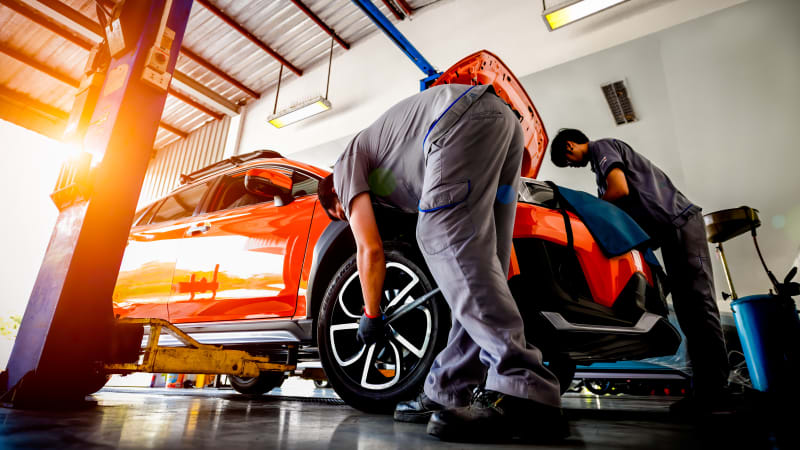Best places to get your car maintained and repaired

In this era of rampant inflation and high interest rates, the challenges of acquiring a car or SUV have been well documented. And so it has never been more important to protect that expensive investment by maintaining it.
In recent months, Autoblog has shared Consumer Reports’ evaluation of the least and most expensive car brands to keep running, as well as tips to prolong a car’s useful life. Especially since the pandemic, a number of factors have impacted these costs: more complex vehicles, new materials and manufacturing methods, a shortage of qualified technicians and replacement parts. Since 2022, repairs costs have jumped each year by about 10 percent.
This month, Consumer Reports is offering a useful primer on keeping your ride in great shape, suggesting what might be the best options for searching out a repair shop, depending, as CR says, “on your car and your situation.”
Author Ben Preston identifies three basic types of repair facilities: dealership service departments, independently owned repair shops, and chain repair shops. Building up trust with a specific shop and feeling comfortable going there is important. Preston quotes John Ibbotson, chief mechanic at Consumer Reports’ Auto Test Center: “You might be able to save a few bucks by going to whichever shop offers the cheapest prices, but if you want consistent, reliable service, it’s best to find a repair shop you trust and stick with it,” Ibbotson says.
The story goes on to evaluate each type of service facility. Here’s a breakdown of CR’s findings:
Dealerships
These work well for owners of newer cars, especially for covered warranty work. But the disadvantage is the high labor rates common to dealer service. Satisfaction ratings for dealer service departments range from very good (Acura, Lexus, Mazda, and Volvo) to not-so-good (Jeep and Kia).
Dealers are best for:
Fixing infotainment system glitches: “If the screen in the center of your dash has a habit of freezing up, or the touchscreen-activated climate controls aren’t working, the dealership is the most likely place to find someone with the know-how to fix problems that maybe only a factory-authorized technician can access,” Ibbotson says.
Safety system recalibration: “Anything from a crack in your windshield to a minor fender dent can upset the calibration of the sensors that make features like automatic emergency braking and adaptive cruise control work,” says Ibbotson. Many independent shops aren’t equipped to recalibrate the sensors so that they can accurately calculate the car’s position in relation to other cars and road hazards. Price: $300-$600.
Software updates: Modern cars are basically rolling computers, with computer modules controlling everything from power windows to engine and transmission operation. “A software malfunction can cause any number of problems — a poorly shifting transmission or exterior lights that don’t illuminate, for example — and may have to be tackled at the dealership, which should have technicians trained on these specific problems,” says Ibbotson. Newer cars may be able to receive software updates wirelessly, but older ones will need face time with a technician if there’s an issue. Price: $150-$200 (and more for luxury marques).
Not so great for:
Saving money on service and repairs that could be done at a qualified independent shop for less.
Independent repair shops
According to CR’s repair shop survey, independent repair shops received excellent scores for honesty, quality of work, time to complete the repair, and communication. They also received very good scores for price and getting the problem solved on the first visit.
Independents are best for:
Basic maintenance: Oil changes, fluid level checks, tire pressure checks. Says Ibbotson, “Any experienced tech will do. Performing these procedures are good opportunities for your regular independent technician to check in on your car’s overall health.” Price: $131-$145 (oil change).
Suspension shock/strut: Worn struts, shocks, and other suspension parts can lead to unsafe braking and handling. Replacing them is usually pretty straightforward and can be handled by any competent mechanic. Price: $924-$1,043.
Major engine repair: Labor-intensive jobs such as a timing belt replacement or a new transmission installation can usually be handled well by an independent repair shop. Price: $1,915-$2,220 (head gasket replacement).
Water pump: This is an essential part of your car’s cooling system (even in EVs), and will eventually wear out and need replacement. “Independents can replace it when needed,” Ibbotson says. Price: $732-$866.
Independents are not so great for :
Recall fixes: These are best handled by dealerships, which are informed about the needed work directly by automakers.
Chain repair shops
“Chain repair shops can be a great place to get basic service such as tire installations and wheel alignments at a reasonable price,” Ibbotson says.
Chains are best for :
Tires: Tire replacement is sometimes cheaper at a tire repair chain. Be wary, though, of repair recommendations when it comes to other car parts. Also, “don’t feel forced into getting whatever tires the place has on the shelf,” says Ryan Pszczolkowski, CR’s tire program manager. “First determine the type of tires you need, then ask the shop to order them. Most will.” Price: $169-$240 (per tire).
Alignment: You should get the car aligned when you buy tires (or have suspension parts replaced). Price: $138-$174.
Chains are not so great for :
More complicated repairs.







